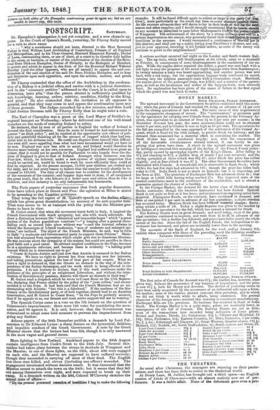The Paris papers of yesterday announce that fresh popular demonstra-
tions have taken place at Genoa and Pisa: the agitation at Milan is gated to be spreading to the_Yeuetian prdvinces.
They bring the full report of M.401.tiztit's speech on thie.ltialian.affairsi. which has given great dissatisfaction,'on account of its anti-popular tone. That tone seems to be at variaece with the policy that the Minister,ree- fesses to have in view.
M. Guizot stated, that when the movement burst forth in Italy, it inspired the French Government with much sympathy, but also with much solicitude. He drew a distinction between the "chimerical and impossible hopes" which" a great portion of the Italian populations entertain"—" a longing after a general remo- delling such as cannot take place without war "—and the internal reforms to which the Sovereigns of Liberal tendencies, "men of moderate and enlarged opi- nions," are inclined. The object of the French Ministers, he said, was to form in Italy " a moderate and Governmental party to support those Princes." Minis- ters had abstained from expressions which might give rise to disastrous illusions. He teas anxious about the sympathy of the masses, but could not sacrifice to them good faith and a good cause. He advised implicit confidence in the Pope, because he is a spontaneous reformer, and because there is evidently " a halting-point beyond which he is determined not to go."
Count de Sainte-Aulaire said just now that Austria is menaced in her Italian existence. We have no right to prevent her from watching over her interests, and taking precautions against the loss of that part of her empire. What we have a right to demand is, that she throws no obstacle in the way of the inde- pendence of the Italian Sovereigns, and the work which is being effected in the peninsula. I do not hesitate to declare, that if this work continues under the guidance of the principles of an enlightened Liberalism, and without the inter- vention of Revolutionary passions, Austria will throw no obstacle in their way." M. Gaizot read a despatch which he wrote to Count Rossi on the 27th Septem- ber, declaring that France abided by the policy of the " juste milieu," and recom- mended it to the Pope. It had been said that the French Ministers had an un- derstanding with Austria: "but this is a falsehood." If the madness of the Sta- tionary or the Revolutionary party, or of both together, should lead to an Austrian intervention, said M. Guizot to Count Rossi, "let the Pope be perfectly assured, that if he appeals to us, our firmest and most active support will not be wanting."
The Spanish Cortes came to a vote on the 7th instant on the question of Salamanca's impeachment: there were 128 votes for considering the accu- sation, and 39 against it. It is said, however, that the Government was determined to adopt some bold measure to prevent the impeachment from going any further.
Athens papers of the 30th December publish a despatch by Lord Pal- merston to Sir Edmund Lyons: a sharp lecture on the tyrannical, faithless, and impolitic conduct of the Greek Government. A note by the Greek Minister shows that the lecture had been felt, though it is only answered in the most vague and general terms.


























 Previous page
Previous page